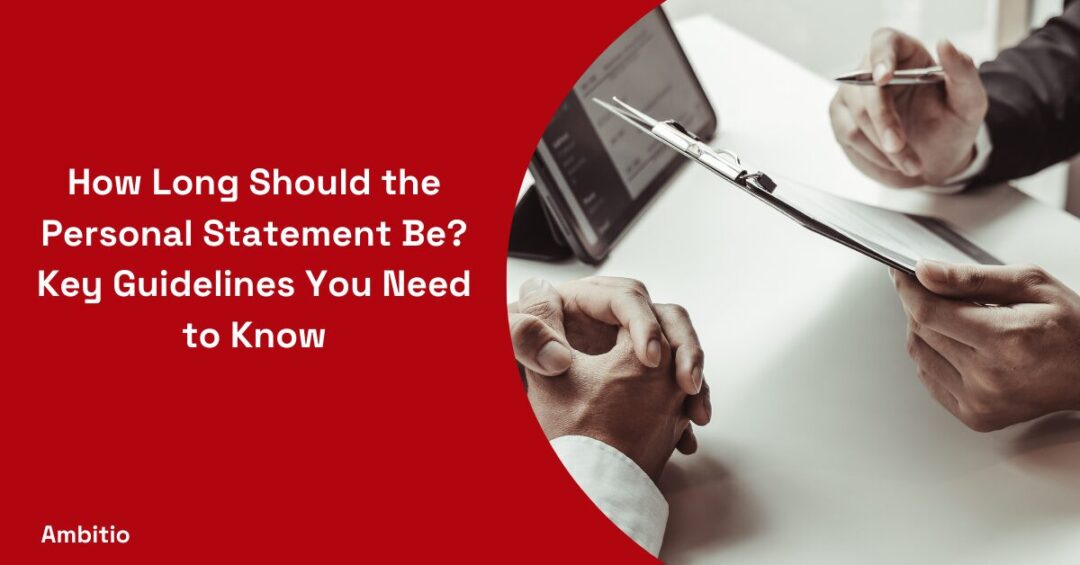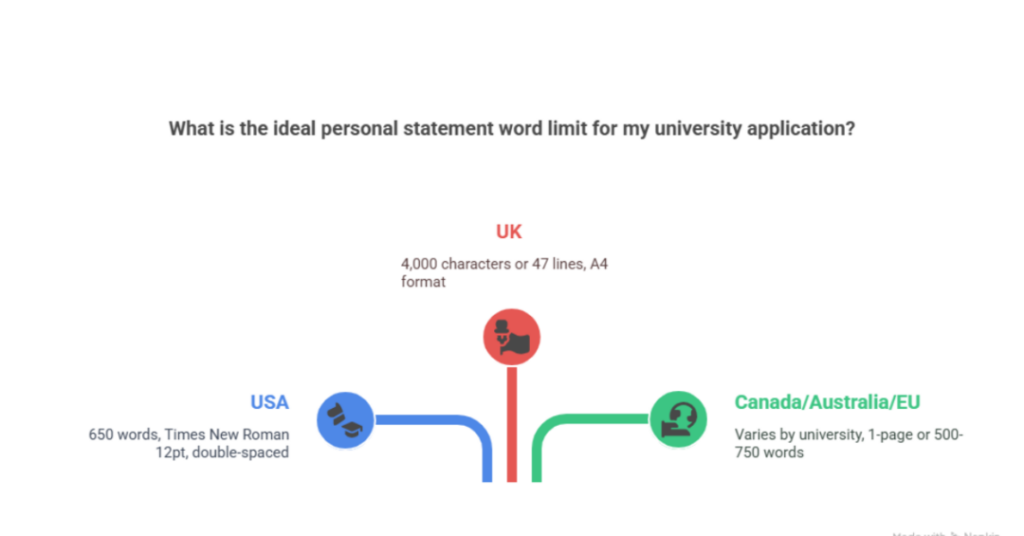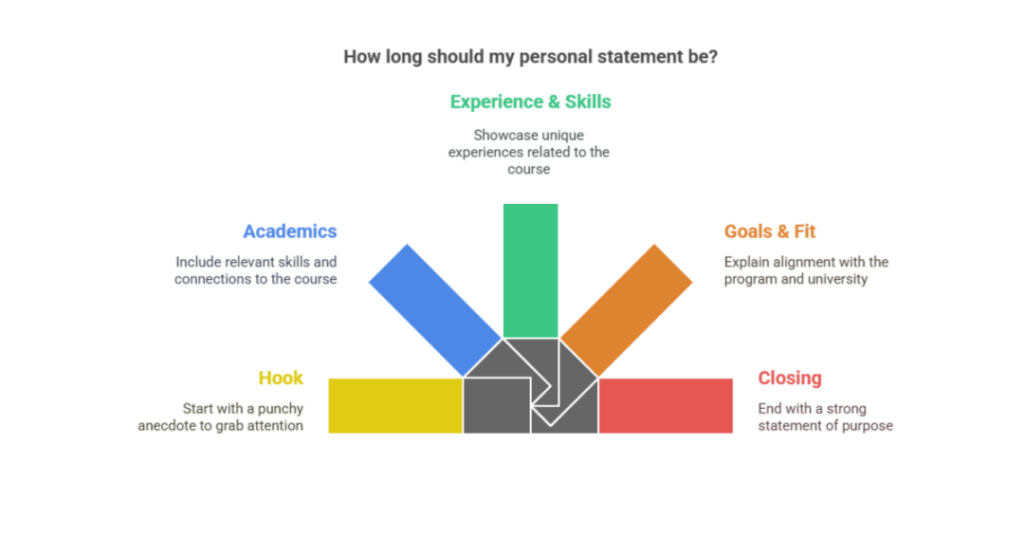24 May 2025
7 minutes read
How Long Should the Personal Statement Be? Key Guidelines You Need to Know

Key Takeaways
- How long should the personal statement be is vital for Indian students to keep clarity and include key points admissions committees look for.
- Follow country-specific word or character limits carefully, especially for UCAS and Common App applications.
- Smart editing and clear structure help create a unique, compelling personal statement that fits the limits and stands out.
Over 60% of Indian students applying abroad Google “how long should the personal statement be” just days before the deadline, often in panic. And it shows. From overshooting the word count to squeezing life into a robotic A4, most personal statements end up ignored by the admissions officer.
Length is not just a format issue, it’s where most Indian students either lose clarity or skip key points entirely. Knowing the ideal structure helps you craft a personal statement that actually stands out.
Ideal Personal Statement Word Limit for Popular Countries
If you’re wondering how long should the personal statement be, you’re not alone, especially among Indian students navigating complex university admissions.

The word count isn’t just a formality; it’s where most applicants lose direction or miss key points the admission committee looks for.
USA
For Common App and most U.S. universities, the ideal personal statement word count is 650 words. Start a personal statement that showcases your relevant skills, specific examples, and interest in the subject. Use a clear and concise structure—Times New Roman, 12pt, and double-spaced is a safe bet. This is your chance to write a personal statement that sets you apart from other applicants.
UK (UCAS)
The UCAS personal statement for university applications has a strict 4,000-character limit or 47 lines—whichever comes first. It must fit within one side of A4 in your UCAS application. Fall into the trap of overwriting, and you’ll cut off crucial sections. Keep it straight to the point, include your work experience, and make your personal statement stand by sticking to main points the admissions tutor expects.
Canada, Australia, and EU
There’s no one-size-fits-all word count. Each university name and program may define its own ideal personal statement length. Some ask for a 1-page statement, others want 500–750 words, especially for personal statements for postgraduate or business school applications. Always proofread your statement, and follow formatting—Arial or Times New Roman, 11–12pt font, and single spacing. Crafting a personal statement that fits their format and reflects your enthusiasm for the subject helps you stand out from the crowd.
How long can a personal statement be if there’s no word limit?
If there’s no set word limit for your personal statement, focus on quality over quantity. Admissions at top universities like Harvard University, Stanford University, and the University of Oxford value clear, concise, and relevant content that highlights your GPA, IELTS or TOEFL scores, and achievements like GRE or GMAT results.
Use this opportunity to showcase your unique story, academic goals, and why you deserve scholarships for international students. Keep it focused and avoid unnecessary details. Also, complement your statement with strong letters of recommendation to strengthen your application and make a memorable impression on the admissions committee.
Word Count vs. Character Count: Know the Difference
When you write your personal statement, especially for a university application, knowing the difference between word count and character count isn’t just technical, it’s essential. Many personal statements get cut off or rejected simply because applicants misunderstood the limit.
Here’s a quick breakdown to help you avoid this common mistake and ensure your statement meets the specific requirements of any particular university:
| Metric | What It Means | Where It’s Used | Why It Matters |
|---|---|---|---|
| Word Count | Number of words in your paragraph or full personal statement | USA (Common App), Canada, Australia, most EU universities | Helps you stay clear, focused, and within guidelines to craft a compelling statement |
| Character Count | Every letter, space, and punctuation mark is counted | UK (UCAS personal statement), some EU/Asia universities | UCAS has a strict character limit—4,000 characters or 47 lines max |
| Line Limit | Total lines used including spaces and blank lines | UCAS, job application platforms | Going beyond 47 lines in a UCAS application may cut off key parts like your conclusion |
| File Format Restrictions | Some portals restrict font type, size, or spacing | Common App, business school platforms | Use font such as Arial, 11–12pt; check for line spacing rules in advance |
Pro Tip: Many personal statements, whether undergraduate personal statement or statement of purpose, are rejected not for content, but for crossing the format. Always read your personal statement aloud, ensure it ends naturally, and stays within the given word or character limits.
Sample Word Count Breakdown for Indian Students
If you’re still wondering how long should the personal statement be, especially as Indian students preparing for a competitive application process, this breakdown will give you clarity.

A well-written personal statement isn’t just about word count; it’s about placing the right content in the right place, with structure that admissions tutors expect.
| Section | Word Count Range | What to Include |
|---|---|---|
| Hook | ~50 words | Start a personal statement with a punchy anecdote or reflection that shows your enthusiasm for the subject you want to study. Make your personal statement stand. |
| Academics | 100–150 words | Include in your personal statement what you’ve studied so far, relevant skills, and how they connect to the course. Use specific examples from school application. |
| Experience & Skills | 200–250 words | Talk about internships, work experience, job application projects, or extracurricular activities. Showcase your unique experiences that relate to the course or career. |
| Goals & Fit | 150–200 words | Explain why you want to study the course at that particular university. Show how your goals align with the program and university admissions expectations. |
| Closing | ~50 words | Conclude your personal statement with a strong statement of purpose. Reaffirm your interest in the subject, and leave a lasting impression—clear and concise. |
What Happens If Your Personal Statement Is Too Long or Too Short?
In the university application process, how long should a personal statement be is not just a formatting detail; it’s a dealbreaker. While a compelling personal statement provides an opportunity to share who you are, missing the length guidelines can instantly weaken your application.
If your statement is too long, it may get cut off mid-sentence (especially in platforms like UCAS with a maximum of 47 lines), leaving out key sections of your personal statement, like why you’re applying or what led you to apply. It also signals poor judgment and inability to follow instructions, something admissions officers quietly flag.
If it’s too short, you risk underselling yourself. You might skip vital sections of your personal statement, such as your motivation, specific examples of relevant skills, or how you fit the course. A short, vague statement may look rushed, making it hard for your one personal story to stand out.
So when you write your statement, don’t rush or overextend. Give yourself plenty of time, follow the required length of a personal statement, and make your statement a clear, focused reflection of what you hope to achieve. The right balance in length can genuinely make or break your application.
Smart Editing Tips to Stay Within Word Count Without Losing Impact
The moment Indian students start writing their personal statements, one question always lingers: How long should the personal statement be? Once the words start flowing, it’s easy to exceed the limit or fall short.
Here are smart editing tips to help you write one personal statement that fits the word count without losing impact:
1. Start With Structure Before You Start Writing
Before drafting, outline the sections your personal statement should include: intro, academics, experience, career goals, and conclusion. This structure helps Indian students stay focused on what each part of the application demands.
2. Replace Generic Sentences With Specifics
Strong personal statements stand out because they avoid vague claims. For example, instead of saying “I love science,” include what school project or competition led you to apply. Personal statement examples that feel personal are more powerful and take up less space.
3. Trim the Fluff Ruthlessly
If you ask for a personal statement review, most feedback will point out wordy phrases. Cut filler like “I believe that I think I want…” and keep your sentences lean. This ensures your statement depends on quality, not quantity.
4. Use Active Voice and Strong Verbs
Make sure your personal statement has energy. Instead of “I was given the chance to lead,” say “I led.” Writing personal statements in active voice saves space and boosts impact.
5. Combine Ideas Smartly
If two sentences say similar things, merge them. For example, “I enjoy research. I also enjoy analysis.” → “I enjoy research and data analysis, especially in fieldwork.” This is essential when school personal statements have strict limits.
6. Read Aloud and Edit in Layers
Once you write one, read your personal statement out loud. This helps you catch awkward phrasing. Then edit in layers, first for clarity, then word count, then tone. Each round should help you craft a compelling final version.
7. Always Leave Room for a Strong Ending
Never let your conclusion get cut. It’s the section of your personal statement that allows you to share what you hope to achieve and how you’ll contribute to the place on the course. Save 50–70 words for this.
Conclusion
How long should the personal statement be is a question every Indian student must answer carefully. A good personal statement balances a compelling opening paragraph, a clear structure, and unique content that truly reflects who you are. Remember, the personal statement you need to write is your chance to stand out, so make it authentic and focused.
Ready to craft a personal statement that captures attention and gets results? At Ambitio, we specialize in profile building that makes your application shine. Join Ambitio Elite today, let’s turn your story into the strong statement that wins admissions!
FAQs
How long should the personal statement be for university applications?
Most universities recommend the personal statement be about 500–650 words, so check their specific guidelines for how long should the personal statement be.
How long should the personal statement be for graduate school?
Graduate schools typically ask for 1–2 pages, so always verify how long should the personal statement be for each program.
How long should the personal statement be for medical school?
For medical school, how long should the personal statement be is usually capped at 4,500 characters (including spaces).
How long should the personal statement be for law school?
Law schools generally expect 1–2 pages, double-spaced; always confirm how long should the personal statement be with each school.
How long should the personal statement be for scholarships?
Scholarship personal statements usually range from 500–1,000 words, so check how long should the personal statement be in the application instructions.
How long should the personal statement be if there’s no word limit?
If no limit is given, aim for 500–800 words to ensure your answer to how long should the personal statement be is concise and comprehensive.
How long should the personal statement be for job applications?
For job applications, how long should the personal statement be is typically a single paragraph or about half a page.

You can study at top universities worldwide!
Get expert tips and tricks to get into top universities with a free expert session.
Book Your Free 30-Minute Session Now! Book a call now




























